FINANCE
Sam Bankman-Fried’s downfall sends shockwaves through crypto
Published
2 years agoon

NEW YORK — Sam Bankman-Fried received numerous plaudits as he rapidly achieved superstar status as the head of cryptocurrency exchange FTX: the savior of crypto, the newest force in Democratic politics and potentially the world’s first trillionaire.
Now the comments about the 30-year-old Bankman-Fried range from bemused to hostile after FTX filed for bankruptcy protection Friday, leaving his investors and customers feeling duped and many others in the crypto world fearing the repercussions. Bankman-Fried himself could face civil or criminal charges.
“I’ve known him for a number of years and what just happened is just shocking,” said Jeremy Allaire, the co-founder and CEO of cryptocurrency company Circle.
Under Bankman-Fried, FTX quickly grew to be the third-largest exchange by volume. The stunning collapse of this nascent empire has sent tsunami-like waves through the cryptocurrency industry, which has seen a fair share of volatility and turmoil this year, including a sharp decline in price for bitcoin and other digital assets. For some, the events are reminiscent of the domino-like failures of Wall Street firms during the 2008 financial crisis, particularly now that supposedly healthy firms like FTX are failing.
One venture capital fund wrote down investments in FTX worth over $200 million. The cryptocurrency lender BlockFi paused client withdrawals Friday after FTX sought bankruptcy protection. The Singapore-based exchange Crypto.com saw withdrawals increase this weekend for internal reasons but some of the action could be attributed to raw nerves from FTX.
“Sam what have you done?,” tweeted Sean Ryan Evans, host of the cryptocurrency podcast Bankless, after the bankruptcy filing.
Bankman-Fried and his company are under investigation by the Department of Justice and the Securities and Exchange Commission. The investigations likely center on the possibility that the firm may have used customers’ deposits to fund bets at Bankman-Fried’s hedge fund, Alameda Research, a violation of U.S. securities law.
“This is the direct result of a rogue actor breaking every single basic rule of fiscal responsibility,” said Patrick Hillman, chief strategy officer at Binance, FTX’s biggest competitor. Early last week Binance appeared ready to step in to bail out FTX, but backed away after a review of FTX’s books.
The ultimate impact of FTX’s bankruptcy is uncertain, but its failure will likely result in the destruction of billions of dollars of wealth and even more skepticism for cryptocurrencies at a time when the industry could use a vote of confidence.
“I care because it’s retail investors who suffer the most, and because too many people still wrongly associate bitcoin with the scammy ‘crypto’ space,” said Cory Klippsten, CEO of Swan Bitcoin, who for months raised concerns about FTX’s business model. Klippsten is publicly enthusiastic about bitcoin but has long had deep skepticism about other parts of the crypto universe.
Bankman-Fried founded FTX in 2019, and it grew rapidly — it was recently valued at $32 billion. The son of Stanford University professors, who was known to play the video game “League of Legends” during meetings, Bankman-Fried attracted investments from the highest echelons of Silicon Valley.
Sequoia Capital, which over the decades invested in Apple, Cisco, Google, Airbnb and YouTube, described their meeting with Bankman-Fried as likely “talking to the world’s first trillionaire.” Several of Sequoia’s partners became enthusiastic about Bankman-Fried following a Zoom meeting in 2021. After several more meetings, Sequoia decided to invest in the company.
“I don’t know how I know, I just do. SBF is a winner,” wrote Adam Fisher, a business journalist who wrote a profile of Bankman-Fried for the firm, referring to Bankman-Fried by his popular online moniker. The article, published in late September, was removed from Sequoia’s website.
Sequoia has written down its $213 million in investments to zero. A pension fund in Ontario, Canada wrote down its investment to zero as well.
In a terse statement, the Ontario Teachers’ Pension Fund said, “Naturally, not all of the investments in this early-stage asset class perform to expectations.”
But up until last week, Bankman-Fried was seen as a white knight for the industry. Whenever the crypto industry had one of its crises, Bankman-Fried was the person likely to fly in with a rescue plan. When online trading platform Robinhood was in financial straits earlier this year — collateral damage from the decline in stock and crypto prices — Bankman-Fried jumped in to buy a stake in the company as a sign of support.
When Bankman-Fried bought up the assets of bankrupt crypto firm Voyager Digital for $1.4 billion this summer, it brought a sense of relief to Voyager account holders, whose assets has been frozen since its own failure. That rescue is now in question.
FTX’s failure started after the cryptocurrency news outlet CoinDesk published a story, based on a leaked balance sheet from Alameda Research. The story found that the relationship between FTX and Alameda Research was deeper and more intertwined than previously known, including that FTX was lending high quantities of its own token FTT to Alameda to help build up cash. It sparked mass withdrawals from FTX, causing the crypto firm to experience a very old financial problem: a bank run.
“FTX created a worthless token out of thin air and used it to make its balance sheet appear more robust than it really was,” Klippsten said.
As king of crypto, Bankman-Fried influence was starting to pour into political and popular culture. FTX bought prominent sports sponsorships with Formula One Racing and bought the naming rights to an arena in Miami, and ran Super Bowl ads featuring “Seinfeld” creator Larry David. He pledged to donate $1 billion toward Democrats this election cycle — his actual donations were in the tens of millions — and prominent politicians like Bill Clinton were invited to speak at FTX conferences. Football star Tom Brady invested in FTX, as did his supermodel soon-to-be-ex-wife Gisele Bündchen.
Bankman-Fried had been the subject of some criticism before FTX collapsed. While he largely operated FTX out of U.S. jurisdiction from his headquarters in The Bahamas, Bankman-Fried was increasingly vocal about the need for more regulation of the cryptocurrency industry. Many supporters of crypto oppose government oversight. Now, FTX’s collapse may have helped make the case for stricter regulation.
One of those critics was Binance founder and CEO Changpeng Zhao. The feud between the two billionaires spilled out onto Twitter, where Zhao and Bankman-Fried collectively commanded millions of followers. Zhao helped kickstart the withdrawals that doomed FTX when he said Binance would sell its holdings in FTX’s crypto token FTT.
“What a s(asterisk)(asterisk)t show … and it’s going to be crypto’s fault (instead of one guys’s fault),” Zhao wrote on Twitter on Saturday.
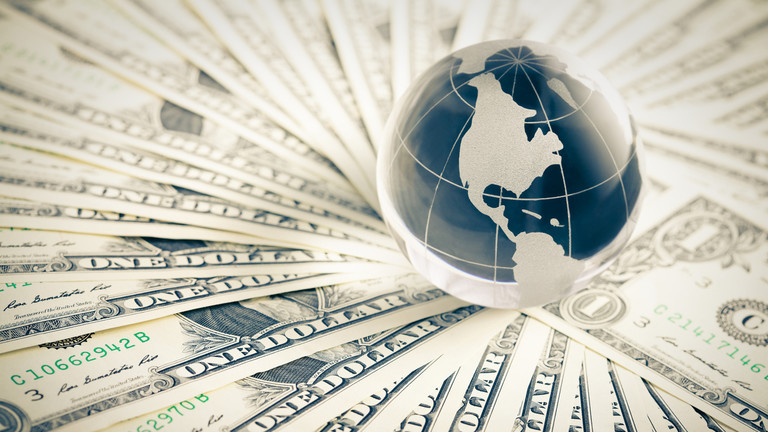
It’s now $45 trillion higher than its pre-pandemic level and is expected to continue growing rapidly, a top trade body has warned
The global debt pile increased by $8.3 trillion in the first quarter of the year to a near-record high of $305 trillion amid an aggressive tightening of monetary policy by central banks, the Institute of International Finance (IIF) has revealed.
According to its Global Debt Monitor report on Wednesday, the reading is the highest since the first quarter of last year and the second-highest quarterly reading ever.
The IIF warned that the combination of such high debt levels and rising interest rates had pushed up the cost of servicing that debt, prompting concerns about leverage in the financial system.
“With financial conditions at their most restrictive levels since the 2008-09 financial crisis, a credit crunch would prompt higher default rates and result in more ‘zombie firms’ – already approaching an estimated 14% of US-listed firms,” the IIF said.
Despite concerns over a potential credit crunch following recent turmoil in the banking sectors of the United States and Switzerland, government borrowing needs to remain elevated, the finance industry body stressed.
According to the report, aging populations and rising healthcare costs continue putting strain on government balance sheets, while “heightened geopolitical tensions are also expected to drive further increases in national defense spending over the medium term,” which would potentially affect the credit profile of both governments and corporate borrowers.
“If this trend continues, it will have significant implications for international debt markets, particularly if interest rates remain higher for longer,” the IIF cautioned.
The report showed that total debt in emerging markets hit a new record high of more than $100 trillion, around 250% of GDP, up from $75 trillion in 2019. China, Mexico, Brazil, India and Türkiye were the biggest upward contributors, according to the IIF.
As for the developed markets, Japan, the US, France and the UK posted the sharpest increases over the quarter, it said.
For more stories on economy & finance visit TSFT’s business section
You can share this story on social media:
PLEASANT MUSIC FOR YOUR CAFE, BAR, RESTAURANT, SWEET SHOP, HOME
SUITABLE MUSIC FOR YOGA LOVERS
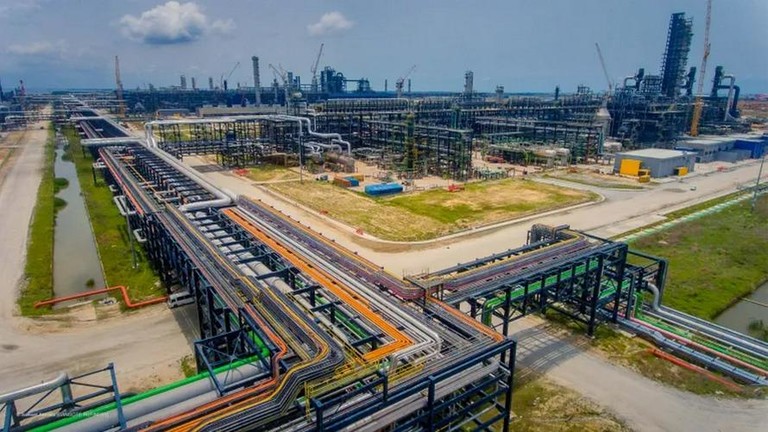
The West African country has built a giant oil refinery to cover domestic demand
Nigeria will commission its new Dangote Petroleum Refinery on Monday in hope of alleviating the chronic fuel shortages that have turned Africa’s biggest oil producer into a fuel importer.
The processing plant, which has capacity of 650,000 barrels per day, is expected to cover all of the country’s fuel demand, according to Nigerian media.
Built by Dangote Group, a conglomerate owned by billionaire industrialist and Africa’s richest man Aliko Dangote, at the Lekki free trade zone near the city of Lagos, the refinery is being touted as a way to end the country’s reliance on imports for nearly all of its refined petroleum products.
The giant complex is one of Nigeria’s single largest investments. It comprises a 435-megawatt power station, a deep seaport and a fertilizer unit. Initially, $12 billion was earmarked to build the refinery, but the project ended up costing $19 billion after years of delay.
Crude processing is scheduled to begin in June, although the research consultancy firm Energy Aspects said that commissioning was an intricate process and that the facility may only start operating later this year. It is expected to reach about 50-70% of processing capacity next year and full capacity by 2025.
The refinery will produce Euro-V quality gasoline and diesel, as well as jet fuel and polypropylene, the company said, adding that the facility was “designed to process a large variety of crudes including many of the African crudes, some of the Middle Eastern crudes and the US Light Tight Oil.”
Despite being Africa’s biggest oil producer, Nigeria imports petrol, diesel, and processed petroleum products because many of its own refineries have dilapidated over the years.
Russia accounts for lion’s share of India’s oil imports – Reuters
Dangote expects the new plant to cover Nigeria’s domestic fuel needs and produce extra volumes for export. It is also expected to boost the market for Nigerian crude to $21 billion per year, the company added.
The Nigerian National Petroleum Corporation has a contract with Dangote to supply some 300,000 barrels of crude per day. However, theft, pipeline vandalism, and underinvestment poses a threat to achieving full output, economist Kelvin Emmanuel told Reuters.
In April, Nigerian oil production slumped under 1 million bpd, below Angola’s output, data showed.
According to Emmanuel, Dangote might be importing oil from international trading companies such as Trifigura and Vitol, as the refinery has not yet signed agreements with oil majors in Nigeria.
Meanwhile, Energy Aspects expects the Dangote refinery to not only solve Nigeria’s fuel shortages but also to reshape the gasoline market in the Atlantic basin.
For more stories on economy & finance visit TSFT’s business section
You can share this story on social media:
PLEASANT MUSIC FOR YOUR CAFE, BAR, RESTAURANT, SWEET SHOP, HOME
SUITABLE MUSIC FOR YOGA LOVERS
FINANCE
US will default if debt deal fails – treasury secretary
Published
12 months agoon
May 24, 2023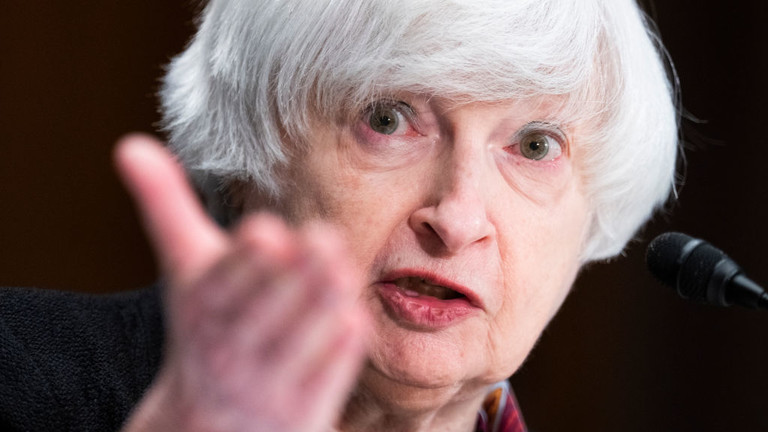
The current borrowing limit is a constraint on Washington’s ability to meet its obligations, Janet Yellen insists
America’s chances of paying its bills after June 1 are “quite low,” US Treasury Secretary Janet Yellen warned on Sunday in an interview with NBC’s ‘Meet the Press’.
According to Yellen, if Congress fails to reach an agreement on raising the country’s $31.4 trillion borrowing limit by that time, it will be forced to default on “some bills” shortly after.
“There’s always uncertainty about tax receipts and spending. And so it’s hard to be absolutely certain about this, but my assessment is that the odds of reaching June 15, while being able to pay all of our bills, is quite low… My assumption is that if the debt ceiling isn’t raised, there will be hard choices to make about what bills go unpaid,” Yellen said.
The treasury secretary did not say which ‘bills’ she had in mind, but noted that the government’s most immediate obligations range from paying interest on outstanding debt to “obligations to seniors who count on social security, military, contractors who’ve provided services to the government.”
She added that “there can be no acceptable outcomes if the debt ceiling isn’t raised.”
The administration of US President Joe Biden and Republicans led by House Speaker Kevin McCarthy have been at an impasse over raising the debt ceiling for several months, despite warnings that the US could face its first-ever default unless it is raised by June 1.
Republicans are refusing to agree to the move unless Biden agrees to government spending cuts and curbs on social programs.
Some lawmakers have called on Biden to invoke his powers under the 14th Amendment to the Constitution and bypass Congress and unilaterally raise the debt ceiling. However, Biden told reporters on Sunday that while he has considered doing so, there is likely not enough time before the deadline.
Biden and McCarthy are scheduled to meet again on Monday to discuss the matter.
For more stories on economy & finance visit TSFT’s business section
You can share this story on social media:
PLEASANT MUSIC FOR YOUR CAFE, BAR, RESTAURANT, SWEET SHOP, HOME
SUITABLE MUSIC FOR YOGA LOVERS



Global debt balloons to record highs

German military to sell tons of toilet paper

First female Saudi astronaut heads to space

Nigeria takes step to combat fuel shortages

US will default if debt deal fails – treasury secretary

Village People demand Trump stop using their music

Hollywood star pulls out of hosting awards show amid strike

Rock icon slams German authorities

Agatha Christie novels chopped by ‘sensitivity readers’ – media

Marvel star back in training after breaking over 30 bones

Turkish minister escapes fire blast (VIDEO)

Trump savages pop star’s Super Bowl performance

Alec Baldwin sued by Ukrainian family of slain cinematographer

Duran Duran stumbles, Dolly Parton rolls into Rock Hall

Sweden probes possible plot behind Russian pipeline leaks

FINANCE


Global debt balloons to record highs
It’s now $45 trillion higher than its pre-pandemic level and is expected to continue growing rapidly, a top trade body...


Nigeria takes step to combat fuel shortages
The West African country has built a giant oil refinery to cover domestic demand Nigeria will commission its new Dangote...
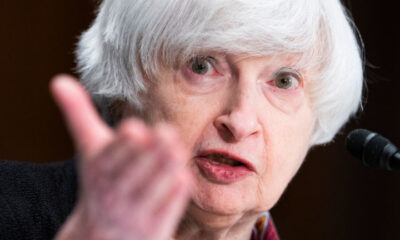

US will default if debt deal fails – treasury secretary
The current borrowing limit is a constraint on Washington’s ability to meet its obligations, Janet Yellen insists America’s chances of...


Facebook parent Meta fined €1.2 billion by Irish watchdog
The American tech company has been accused of violating EU data privacy rules US tech giant Meta has been hit...


UK’s business with sanctioned country booming
Trade between Britain and Iran has reached the highest level in a decade, according to official data, apparently having been...

POLITICS


Erdogan election defeat would be ‘revenge’ – Syrian Kurds
The YPG claims the Turkish president failing to win another term would be payback for Ankara’s counter-terrorism operations in Syria...


Chinese special envoy meets with Zelensky
Li Hui visited Kiev to share Beijing’s views on a political settlement to the Ukraine crisis Ukrainian President Vladimir Zelensky...


Pakistan’s top court orders release of former PM Imran Khan
Pakistan’s Supreme Court has ordered the release of former prime minister Imran Khan, whose arrest earlier this week triggered deadly...


Kamala Harris to run AI taskforce
The US vice president will ask AI execs to evaluate the safety and fairness of their models US Vice President...


Most Americans want to move on from Biden and Trump – poll
70% of respondents said the incumbent shouldn’t bid for office in 2024, with that figure 60% for the Republican former...

OPINION


Disgraced ex-PM Liz Truss seeks to ruin any hopes for normal UK-China ties
The former premier’s Taiwan trip is nothing but a provocation for Beijing to lash out at London, sinking any constructive...


India facing challenge to steer SCO agenda away from Western-dominated frameworks
The Shanghai Cooperation Organisation is looking at ways to address the most pressing global issues without being a disruptive influence...


China isn’t the biggest threat to Italy’s prosperity
Rome is considering leaving the Belt and Road Initiative in a move which will place virtue signaling to other Western...


Meet the Czech lawyer who rallies thousands to shake up the EU establishment
In mid-April, a fledgling political party that recently formed in the Czech Republic called Pravo Respekt Odbornost (Law Respect Expertise;...


UK shows signs of good will to China, but it’s not the one calling the shots in this relationship
The British foreign secretary says antagonizing Beijing goes against London’s ‘national interests’, but Washington has other ideas British Foreign Secretary...

LIFE


conic Smiths bassist dies aged 59
The bassist with legendary English rock band The Smiths, Andy Rourke, has died at the age of 59, the group’s...


Village People demand Trump stop using their music
A viral video emerged last week of Donald Trump dancing to a Village People song at his Florida estate Village...


Hollywood star pulls out of hosting awards show amid strike
Drew Barrymore is stepping down as host of this year’s MTV Movie & Music Awards, due to be held on...


Mexico condemns US ‘interference’ in drug war
The DEA’s infiltration of the Sinaloa Cartel without state permission amounts to espionage, the Mexican president says Mexican President Andres...


Rock icon slams German authorities
Pink Floyd co-founder Roger Waters criticized the city of Frankfurt for canceling his concert and vowed to take legal action...



Trending
-

 FINANCE12 months ago
FINANCE12 months agoFacebook parent Meta fined €1.2 billion by Irish watchdog
-
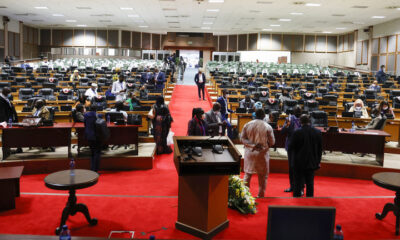
 NEWS12 months ago
NEWS12 months agoKenya supports creation of pan-African court
-

 FINANCE12 months ago
FINANCE12 months agoUS will default if debt deal fails – treasury secretary
-

 FINANCE12 months ago
FINANCE12 months agoGlobal debt balloons to record highs
-
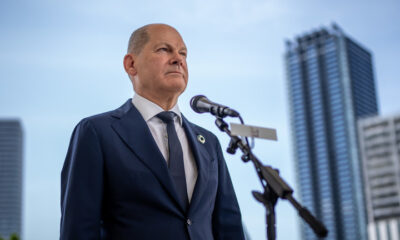
 WAR12 months ago
WAR12 months agoUkraine won’t join NATO anytime soon – Scholz
-

 NEWS12 months ago
NEWS12 months ago‘Subway killer’ Daniel Penny’s actions expose a gap in US law enforcement
-

 NEWS12 months ago
NEWS12 months agoGerman military to sell tons of toilet paper
-

 NEWS12 months ago
NEWS12 months agoFirst female Saudi astronaut heads to space


